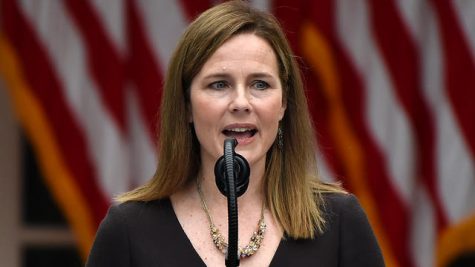Why Trump’s Supreme Court nomination is so controversial
Amy Coney Barrett and Vice President Mike Pence on the steps of the Capitol before meeting with Senators Sept. 29.
President Trump announced on Saturday, Sept. 26 that he would nominate Federal Appeals Court Judge Amy Coney Barrett to the Supreme Court. This nomination occurred shortly after previous Supreme Court Justice, Ruth Bader Ginsburg, passed away on Sept. 18. With the vast differences in these two women’s political viewpoints and the unwavering Republican majority that this would create, this nomination forebodes a threat to the freedom of millions of Americans as we know it.
Barrett is a deeply conservative jurist with strong opinions on many hot-button topics in today’s society. Barrett is unable to separate her faith from her political views, pro-life, against gay marriage, a gun rights advocate, and has a years-long record of ruling against immigrants.
Regardless of their views on her stances, many Americans believe that no justice should be confirmed until after the election.
“I do think it is hypocritical of the Senate to say in 2016 that they would wait to confirm Obama’s nomination until after the election, and then say that in this case that they would try to confirm Trump’s nomination before the election,” said Boone Brackett, senior.
I agree, and strongly believe that there should be a universal policy on this–and that the Senate should be held to it.
Barrett is a devout Catholic woman. I see nothing wrong with having justices from varying religious backgrounds; in fact I support it.
“I don’t think there is a problem with a Catholic Supreme Court Justice the same way I don’t think there is a problem with a Muslim or a Jewish one, as long as they have met the qualifications to have proven to be and impartial decision maker,” Brackett said.
The problem here is that Barrett has not proven to be an impartial decision maker. In her and John. H. Garvey’s article titled “Catholic Judges in Capital Cases,” Barrett speaks on her inability to separate her religion from her work in the government.
“I’m not surprised that the GOP and Trump would nominate such a conservative figure,” said Ellie Peña, senior. “I disagree with most of her stances but take the most issue with her refusal to separate church and state…Religious freedom is part of America’s foundation, and incorporating religion into legislation is frankly un-American.”
As a country built on religious freedom, America’s allowance of a prominent figure to incorporate any one religion into the making or interpretation of the law is unacceptable. One of the main reasons colonists came to America in the first place was to seek religious freedom. If Barrett is confirmed, the basic principles of America’s foundation will be challenged.

In part due to her devotion to the Catholic faith, Barrett has very conservative opinions on issues such as abortion and gay marriage.
“If Barrett is confirmed the rights of millions of Americans will be taken away. I suspect that Roe v. Wade will be overturned, as well as marriage equality,” Peña said.
There is not one law telling men what they can and can’t do with their bodies’ reproductive systems, yet womens’ bodies seem to constantly be in the political spotlight. It is horrifying that a woman would be the one to deprive women across the nation of their right to privacy in terms of their reproductive health.
Some agree with Barrett’s opinions on abortion in most circumstances.
“I believe that a human life begins at conception, or at least when the heartbeat begins. I think it is immoral to kill humans. Abortion shouldn’t be a right, it should only be a privilege allowed to those in special circumstances,” Brackett said.
Other than a general difference in viewpoint, my main issue with this is even though many people believe that there should be exceptions for special circumstances, like rape or incest, they still support people who don’t believe in those special circumstances. At the end of the day many women are stuck with a life-altering reminder of the abuse they experienced.
Additionally, the same people who want to make abortion illegal, like Barrett, also want to reduce social welfare. This creates a dilemma when it comes to parents who aren’t financially capable of supporting a child but are without welfare support systems. There will be a segment of women and children in society destined for poverty, limited upward mobility, and little, if any, support network.
As for marriage equality, once again, America was built upon freedom. Taking this away would wreck the homes of thousands of Amercians. The legal benefits of marriage, including insurance and tax status, would no longer be given to life partners. Not only would this disrupt the stability of the home, but also it will increase the rates of childhood trauma from children in these homes. Additionally, a basic freedom to love that isn’t hurting anyone will be taken away.
As for whether or not she will be confirmed, only time will tell.
“I do think she will be confirmed. There is nothing the Democrats can do to stop the process, and not enough Republicans oppose a confirmation vote,” said Mr. Christopher Wilbur, social studies teacher.
A recent development throws this certainly into question. Two members of the Senate Judiciary Committee have tested positive for COVID-19, as well as Trump. Whether or not Barrett will be confirmed in time relies on all of their health. Justice Mitch McConnell has said that they will still start the hearings Oct. 12, and will do so virtually.
It’s hard to say what will happen if Barrett does get confirmed.
“The most immediate case she would hear, if confirmed relatively quickly, is about the Affordable Care Act and its constitutionality, which she has questioned in the past. Justice Ginsburg and Judge Barrett would more than likely vote different ways on this issue, but again, it is hard to be presumptuous,” Wilbur said.
This change in the courts will definitely be one for the books.
“This fall’s pace of major events with long-term consequences is unlike anything I have ever seen. The controversy around Judge Barrett’s nomination is in a lot of ways a microcosm of America right now—this controversy has shown how polarized and distrustful the factions in American politics have become,” Wilbur said, “But this isn’t just another fight about policy because Judge Barrett will presumably be on the Court for a long time, and if confirmed by the Senate would help shape a lot of judicial rulings on issues that people are really passionate about.”
At the end of the day it is out of our hands; however, this nomination could change the lives of millions of Americans for the foreseeable future.

Skylar, a senior, is excited to join the Devils’ Advocate Team. She loves dancing and doing yoga. Skylar is an executive member of The Community House’s...













